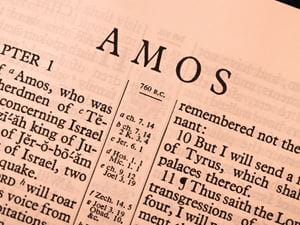
In the Bible, Amos was an Israelite who lived in a divided kingdom. Uzziah ruled over Judah, and Jeroboam was Israel’s king when Amos received the Lord’s word in Amos 1:1. This puts his writing around 760-750 B.C., 170 years before the Babylonians exiled Israel as God’s punishment on the nation.
Amos didn’t serve as a prophet as his job, nor did his father, but he was a dresser of sycamore figs and shepherd, as detailed in Amos 7:14. These two truths imply that Amos came from an impoverished but humble background. Shepherds were among the lowest group in society, and the disadvantaged ate sycamore figs. Amos’ upbringing adds humor to God’s choice for a spokesperson because the wealthy usually oppressed the poor.
What is Amos’ book about?
Amos’ book addresses society’s multiple sides. The book’s central themes include God’s impartial judgment for His people, social justice as a necessary outcome of true virtue, and His call for a holy life. God despises evil in every form, judging sin regardless of who sins. Amos 5:14-15 reminds us that God desires His people to seek earnestly, doing what is good. Prosperity and success marked the nation of Israel, and people led comfortable lives, enjoying abundant food.
Still, society experienced moral and spiritual decay, as described in Amos 2:4. In Amos 2:12-13, we read that the needy and poor were exploited, and corruption emphasized the people’s hypocritical, disingenuous worship. Amos’ book starts with God’s judgment of foreign nations. The Israelites would’ve been at ease reading or hearing God’s plans to judge the pagans. They might feel some joy or delight. However, in Amos 2:4, Amos shifts the attention to the central theme of God’s divine judgment, Israel’s people. Thus begins the predictions of God’s plans for punishment and contentions for the nation of Israel.
How is Amos’ book relevant today?
It’s not unusual for Christians to believe the Old Testament is outdated and irrelevant, having nothing to give our modern society. Believers might avoid reading the Old Testament altogether as a result. Truthfully, the Old Testament, including Amos’ book, can teach us a great deal. As Solomon stated in Ecclesiastes 1:9, there’s nothing new under the sun. Since time’s beginning, humans have always dealt with similar transcendent principles. They may be expressed in different societal forms, but everyone deals with sin, selfishness, wealth, lust and envy.
Amos’ book deals with problems everyone can relate to in principle, providing essential insight into how God views them. These issues include things like worship. Israel’s religious practices didn’t equate to godly behavior in Amos’ time. People went through the motions, like tithing and making sacrifices. Still, their immoral hearts degraded their worship, including idolatry and deliberate disobedience, as detailed in Amos 4:4. Amos mentions Gilgal and Bethel, locations of sacrifice and false worship in chapter four.
God instructed the people to bring their sacrifices to the place of God’s choosing in Deuteronomy, specifically in Deuteronomy 12:5-6. The Lord created the temple as the only location to worship Him. King Jeroboam also established different places of sacrifice and worship so Israel’s people could avoid traveling to Jerusalem. God cares about our worship and the quality of the worship we give Him. Showing up to church every Sunday doesn’t give us automatic acceptance from the Lord. Romans 12:2 reminds us that our whole lives are a continuous act of worship to the Lord, conforming to His word.
Nothing is wrong with comfort or wealth, but when they supersede God and distract us from Him, they become idols in our lives, causing significant issues. Amos showed how comfort and material wealth can become a curse that leads to spiritual destruction. Amos 2:4 reminds us that immoral living is the inevitable result. We enjoy abundant material wealth in our society, and even most of those we consider poor enjoyable things old kings could’ve only imagined, like access to clean water, electricity, and indoor plumbing.
If we aren’t careful, Amos 8:4-6 reminds us that we could find ourselves self-centered, like the people of Israel, neglecting the needs of others and building our worship around our selfish desires. Our pursuit of God doesn’t revolve around our convenience. He should be the central focus of our lives, and sacrificial love is still the nucleus of Christian living. Christians should examine their lives to heed Amos’ warnings regarding these issues.
Another sad truth we see in Amos is God judges His people for their sins, as we read in Amos 3:2. It’s easy for believers to have a false sense of security. One might feel like they aren’t compelled to strive for holiness because they live in God’s grace, no longer condemned for their sins, but nothing could be further from the truth. Because of God’s grace, a believer should give everything to live for His glory.
When a church body or believer finds themselves rebelling, they can expect God to carry out judgment if they don’t repent. God’s judgment on His people has two purposes: it calls them to repent and separates those who are genuinely His from those who aren’t, according to Amos 9:8-10. The church body exists to glorify God. If this fails to happen, the church will be reduced by God’s judgment until it’s restored for His intended purpose.
Why should we know about this prophet?
We can apply the lessons from Amos to every believer’s life. We live in a time like Amos’, where the same issues compromise our walk with God. In the industrialized parts of the world, many enjoy the comforts of our modern era. However, there are believers worldwide who suffer from oppression and injustice. With technology’s advances, the church can extend its span to needy global brothers and sisters. If we’re not careful, we’ll be no better than the Israelites of Amos’ time, who exploited and neglected the impoverished and helpless.
Injustice can undoubtedly exist within the church. Believers should always consciously seek out the needy and underprivileged, whether they’re in another country or their neighborhood. Whether we give our resources, time, or energy, we can make a difference in the lives of those in need. James 2:15-16 reminds us that God doesn’t bless us to enjoy life, but He blesses us so we’re able to bless others.

